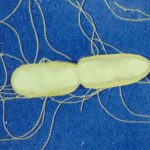Lien vers Pubmed [PMID] – 28348832
Microb Genom 2016 Nov;2(11):e000092
In 2013, an unusual increase in the number of Salmonella enterica serotype Paratyphi A (Salmonella Paratyphi A) infections was reported in patients in Phnom Penh, Cambodia, and in European, American and Japanese travellers returning from Cambodia. Epidemiological investigations did not identify a common source of exposure. To analyse the population structure and genetic diversity of these Salmonella Paratyphi A isolates, we used whole-genome sequencing on 65 isolates collected from 1999 to 2014: 55 from infections acquired in Cambodia and 10 from infections acquired in other countries in Asia, Africa and Europe. Short-read sequences from 80 published genomes from around the world and from 13 published genomes associated with an outbreak in China were also included. Pulsed-field gel electrophoresis (PFGE) was performed on a subset of isolates. Genomic analyses were found to provide much more accurate information for tracking the individual strains than PFGE. All but 2 of the 36 isolates acquired in Cambodia during 2013-2014 belonged to the same clade, C5, of lineage C. This clade has been isolated in Cambodia since at least 1999. The Chinese outbreak isolates belonged to a different clade (C4) and were resistant to nalidixic acid, whereas the Cambodian outbreak isolates displayed pan-susceptibility to antibiotics. Since 2014, the total number of cases has decreased, but there has been an increase in the frequency with which nalidixic acid-resistant C5 isolates are isolated. The frequency of these isolates should be monitored over time, because they display decreased susceptibility to ciprofloxacin, the first-choice antibiotic for treating paratyphoid fever.



